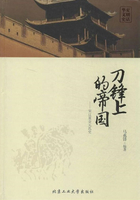Nekhludoff grew especially fond of Kryltzoff, a consumptive young man condemned to hard labour, who was going with the same gang as Katusha. Nekhludoff had made his acquaintance already in Ekaterinburg, and talked with him several times on the road after that. Once, in summer, Nekhludoff spent nearly the whole of a day with him at a halting station, and Kryltzoff, having once started talking, told him his story and how he had become a revolutionist. Up to the time of his imprisonment his story was soon told. He lost his father, a rich landed proprietor in the south of Russia, when still a child. He was the only son, and his mother brought him up. He learned easily in the university, as well as the gymnasium, and was first in the mathematical faculty in his year. He was offered a choice of remaining in the university or going abroad. He hesitated. He loved a girl and was thinking of marriage, and taking part in the rural administration. He did not like giving up either offer, and could not make up his mind. At this time his fellow-students at the university asked him for money for a common cause. He did not know that this common cause was revolutionary, which he was not interested in at that time, but gave the money from a sense of comradeship and vanity, so that it should not be said that he was afraid. Those who received the money were caught, a note was found which proved that the money had been given by Kryltzoff. he was arrested, and first kept at the police station, then imprisoned.
"The prison where I was put," Kryltzoff went on to relate (he was sitting on the high shelf bedstead, his elbows on his knees, with sunken chest, the beautiful, intelligent eyes with which he looked at Nekhludoff glistening feverishly)-- "they were not specially strict in that prison. We managed to converse, not only by tapping the wall, but could walk about the corridors, share our provisions and our tobacco, and in the evenings we even sang in chorus. I had a fine voice--yes, if it had not been for mother it would have been all right, even pleasant and interesting. Here I made the acquaintance of the famous Petroff--he afterwards killed himself with a piece of glass at the fortress --and also of others. But I was not yet a revolutionary. I also became acquainted with my neighbours in the cells next to mine. They were both caught with Polish proclamations and arrested in the same cause, and were tried for an attempt to escape from the convoy when they were being taken to the railway station. One was a Pole, Lozinsky; the other a Jew, Rozovsky. Yes. Well, this Rozovsky was quite a boy. He said he was seventeen, but he looked fifteen--thin, small, active, with black, sparkling eyes, and, like most Jews, very musical. His voice was still breaking, and yet he sang beautifully. Yes. I saw them both taken to be tried.
They were taken in the morning. They returned in the evening, and said they were condemned to death. No one had expected it.
Their case was so unimportant; they only tried to get away from the convoy, and had not even wounded any one. And then it was so unnatural to execute such a child as Rozovsky. And we in prison all came to the conclusion that it was only done to frighten them, and would not be confirmed. At first we were excited, and then we comforted ourselves, and life went on as before. Yes.
Well, one evening, a watchman comes to my door and mysteriously announces to me that carpenters had arrived, and were putting up the gallows. At first I did not understand. What's that? What gallows? But the watchman was so excited that I saw at once it was for our two. I wished to tap and communicate with my comrades, but was afraid those two would hear. The comrades were also silent. Evidently everybody knew. In the corridors and in the cells everything was as still as death all that evening. They did not tap the wall nor sing. At ten the watchman came again and announced that a hangman had arrived from Moscow. He said it and went away. I began calling him back. Suddenly I hear Rozovsky shouting to me across the corridor: 'What's the matter? Why do you call him?' I answered something about asking him to get me some tobacco, but he seemed to guess, and asked me: 'Why did we not sing to-night, why did we not tap the walls?' I do not remember what I said, but I went away so as not to speak to him.















